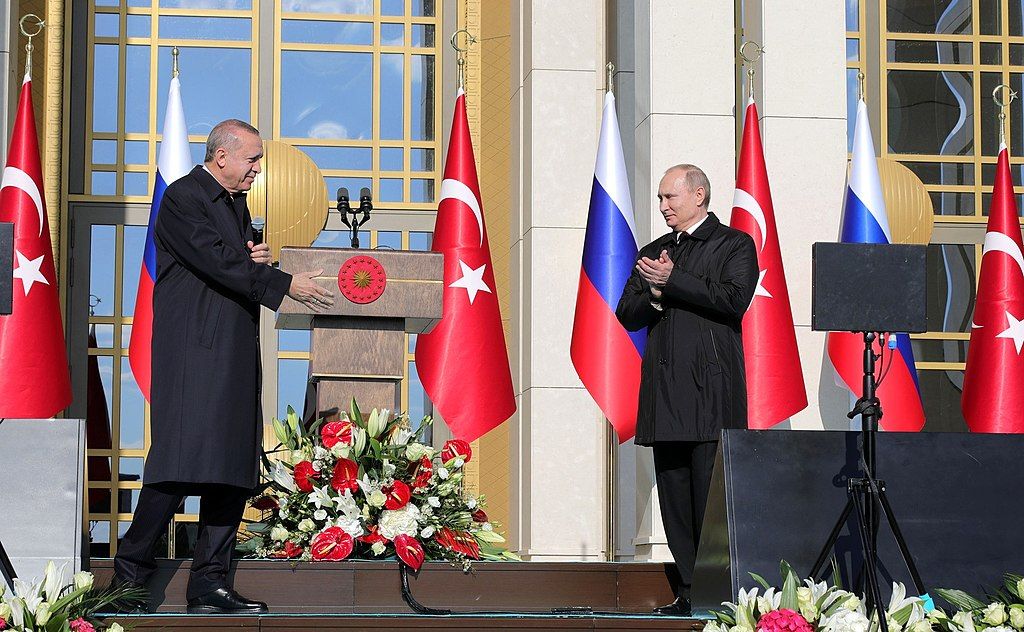A uniquely Turkish nuclear energy tale
By Şebnem Udum | November 24, 2021
 Russian President Vladimir Putin and Turkish President Recep Tayyip Erogan at the groundbreaking ceremony of the Akkuyu Nuclear Power Plant. Credit: www.kremlin.ru CC BY 3.0. Accessed via Wikimedia Commons.
Russian President Vladimir Putin and Turkish President Recep Tayyip Erogan at the groundbreaking ceremony of the Akkuyu Nuclear Power Plant. Credit: www.kremlin.ru CC BY 3.0. Accessed via Wikimedia Commons.
Turkey’s founders drew lessons from the role of foreign debt in the collapse of the Ottoman Empire. That is, prior to the proclamation of the republic in 1923, they focused on economic development. The country’s energy mix of coal, hydroelectricity, and natural gas came to be dominated by natural gas imports from Russia starting in the 2000s. Turkey had tried and failed to add nuclear to its energy basket in the 1970s, 1980s, and 1990s for political and economic reasons. During that time, Turkey either consulted with or engaged in nuclear cooperation talks with Argentina, Canada, Germany, France, South Korea, Sweden, and the United States. Later, in 2007, Turkey solicited bids. Only Russia responded, but its bid failed as the proposed unit price was too high. Eventually, Russia and Turkey signed an intergovernmental agreement in 2010 in which the former would provide the latter with nuclear technology and fuel, which in some quarters deepened Turkey’s concern about being dependent on Russia for energy.
International proponents of nuclear energy tout its affordability, environmental friendliness, and ability to provide abundant, uninterrupted electricity. Meanwhile, international nuclear energy opponents born from the 1960s and ‘70s antinuclear movement were first concerned with nuclear testing and later with nuclear waste disposal. Since Turkey maintained a closed economy until the 1980s, its nuclear energy debate remained independent as well. Unlike the international debate, Turkey’s nuclear energy debate has been shaped by its struggle with development, progress, and identity.
Turkish citizens began to grow concerned about nuclear safety in the mid 1970s, but anti-nuclear opposition started in earnest after 1986, when the Chernobyl nuclear accident affected the northern coast of Turkey. Though official government statements underplayed Chernobyl’s impact on the region, Turkish public perception of nuclear hazards remained—and remains—high. This is due, in part, to an increase in cancer deaths in the Black Sea region, including a famous rock singer, Kazim Koyuncu, who died of cancer in 2005, at the age of 32. Turkish citizens engaged in anti-nuclear protests, demonstrations, and rock concerts highlighting Chernobyl’s impacts. When Greenpeace later arrived in Turkey, the organization added environmental concerns to the discussion.
Before and around the 2011 Fukushima nuclear disaster, Turkey entered what many have dubbed a “nuclear renaissance.” Demand for oil and natural gas had increased at the same time global availability of these resources decreased, due in part to Chinese and Indian economic policies. The Fukushima disaster reminded Turkish citizens of Chernobyl, while also highlighting the potential for natural disasters. On the one hand, anti-nuclear advocates both in Turkey and abroad felt emboldened. On the other hand, proponents trumpeted Japan’s continued reliance on nuclear energy while strengthening safety measures.
Both sides of the nuclear energy debate in Turkey offer convincing arguments for uninformed audiences. They use words like “development,” “energy security,” and “environmental protection,” though with different expected policy outcomes. I attended a nuclear energy panel in 2008 in Ankara; one presenter highlighted the benefits of nuclear power on the basis of energy security criteria (reliability, affordability, and environment-friendliness), while anti-nuclear audience members argued against nuclear power because it was dangerous, expensive, and harmful to the environment. After both sides had accused each other of “treason,” the debate intensified—and I worried a physical fight would break out.
In Turkey’s nuclear energy debate, both proponents and detractors emphasize a need for reducing dependence on foreign energy sources and for promoting economic development. While the antinuclear coalition ranks environmental preservation higher, even it supports the state’s drive to maintain political and economic power.
Some Turkish terms are unique to the country. For example, Ankara formulated the concept of yerli ve millî, meaning “indigenous and national,” to reduce dependence on foreign sources in technology-intensive energy and defense sectors. Russia and Japan had planned to build Turkey’s nuclear power plants in Akkuyu by the Mediterranean and Sinop on the Black Sea coast respectively. As the current government sought to overturn previous administrations’ reliance on foreign suppliers, particularly in the defense, energy, and metals industries, “indigenous technology” became synonymous with “self-reliance.”
Turkey’s first nuclear power plant is under construction in Akkuyu, with an expected operational date in 2023—the 100th anniversary of the republic’s establishment. Turkish nuclear energy proponents anticipate celebrating their country’s entrance into the global “nuclear club.” Opponents worry that, as a newcomer, Turkey will struggle to establish sufficient nuclear safety measures. For example, they point to a lack of environmental impact assessments.
Citizens near the Akkuyu nuclear power plant construction site appear to have accepted the plant in their midst, at least based on my observations during a trip to Taşucu—the closest town to Akkuyu—in the summer of 2021. The construction site’s large security perimeter has quieted anti-nuclear and environmental activist activity. Social unrest is focused on the significant influx of Syrian refugees in Mersin, the central town of the formerly İçel province, where Akkuyu is located. Yet Taşucu’s long coastline has recently become a point of attraction, in a way similar to the French Riviera or Miami Beach. White- and blue-collar Russian employees of the nuclear power plant and their families have turned the environs into an collection of natural and historical sites for tourism. Residents are thriving economically, because of increasing demand for agricultural products, fish, hotels, rental houses, and restaurants. The Taşucu harbor’s importance has risen as ships transport construction materials. Infrastructure renovations have improved land transportation as well. New social facilities and construction have revitalized the local economy—none of which likely would have happened without the construction of a nuclear power plant.
Together, we make the world safer.
The Bulletin elevates expert voices above the noise. But as an independent nonprofit organization, our operations depend on the support of readers like you. Help us continue to deliver quality journalism that holds leaders accountable. Your support of our work at any level is important. In return, we promise our coverage will be understandable, influential, vigilant, solution-oriented, and fair-minded. Together we can make a difference.
Keywords: Turkey, nuclear energy
Topics: Nuclear Energy, Nuclear Risk
















The reason Turkey wound up with Rosatom by default for Akkuyu is that it drove off other bidders, including Westinghouse, with what were seen by these bidders as unreasonable demands for transfer of intellectual property. Since then Rosatom has not been able to attract outside investors to the Akkuyu project and is carrying the financing alone despite the original plan to only pay for 50% of the costs. Obviously, Russia sees the opportunity for achieving geopolitical objectives with Turkey and has committed to all four 1200 MWe VVER units. Separately, Japanese investors pulled out of the Sinop project on the… Read more »
: On June 24th, 2018, President Tayyip Erdogan, along with his pro-Islamic party, the Justice and Development Party, AKP, won the general election in Turkey, which will enable Mr. Erdogan to be a one-man ruler of the Republic of Turkey in the foreseeable future. Now, invested with infinite executive-presidential power, coupled with having complete control of the military, cabinet, judiciary and legislative branches, enables Mr. Erdogan to pursue his ambition to be a “nuclear power leader” in the Sunni Islamic world. The scientific denialism in general and environmental science, in particular, will reach a whole new level of insanity in… Read more »